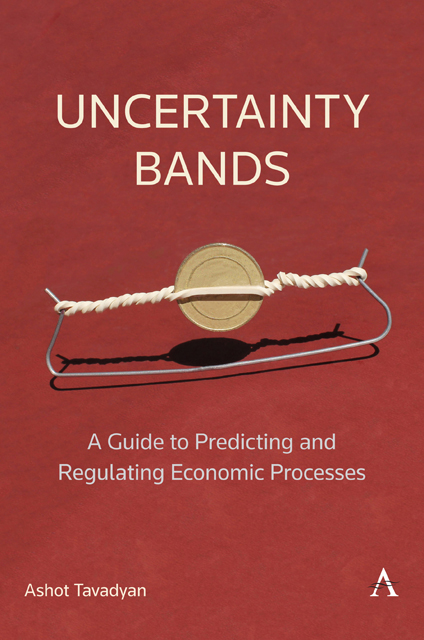Book contents
- Frontmatter
- Contents
- Preface
- Introduction: The Philosophy of Economic Forecasting
- 1 Interval Links in Economy and the Capabilities of Quantitative Thinking
- 2 The Possibilities for Forecasting Economic Indicators
- 3 The Principle of the Minimal Uncertainty Interval
- 4 The Intervals of Key Economic Indicators
- 5 Key Principles of Economic Regulation
- Conclusion
- Appendix: The Uncertainty Relations of Economic Indicators
- Acknowledgments
- Index
Introduction: The Philosophy of Economic Forecasting
Published online by Cambridge University Press: 09 December 2022
- Frontmatter
- Contents
- Preface
- Introduction: The Philosophy of Economic Forecasting
- 1 Interval Links in Economy and the Capabilities of Quantitative Thinking
- 2 The Possibilities for Forecasting Economic Indicators
- 3 The Principle of the Minimal Uncertainty Interval
- 4 The Intervals of Key Economic Indicators
- 5 Key Principles of Economic Regulation
- Conclusion
- Appendix: The Uncertainty Relations of Economic Indicators
- Acknowledgments
- Index
Summary
The main objective of this work is to study the intervals of key economic indicators facilitating economic growth under conditions of uncertain economic processes. The methods herein applied for both the evaluation of key causalities of indicators and the principles of economic forecasts have been stipulated by the factor of uncertainty and by the need for systemic analysis of economic interdependencies. It should be noted that the complexity of the model, as will be demonstrated in this book, has no decisive role in uncovering the main principles of key economic causalities. Based upon the synthesis of economic research and the analysis of statistical data, this book presents a relevant and quite illustrative approach for indicator systematization and interval research. The economy, as any low-validity system, is inherently volatile and hard to predict, making it difficult to unambiguously point out the causalities of an economic system. In this context, determining the interval of indicators is most productive within the bounds in which their values have the highest likelihood.
The book cites a complex analysis of key economic indicators under conditions of uncertainty, which is the natural state of the economy. It clarifies the essence of economic indicators and substantiates the need for certain devices based on their systemic analysis. Any proposal should not logically contradict the causalities of the indicator system. The systematization of economic indicators is a synthesis between the analysis of economic causalities of indicators and the solutions of specific issues in the economy.
The real situation requires a study to be made not only of the state of equilibrium under growth but also mainly of its malfunction, with due regards to the fact that in the economy the unforeseen events may have substantial, even negative aftermaths. Only complex research of the system of economic indicators under uncertainty will help to formulate the principles to be achieved, which will yield adequate solutions.
There exists a widespread, somewhat vulgar notion on the connection between economic research and economic practice that any economic research has to deliver an inventory of specific instructive practical recommendations, and vice versa, any efficient action in economic regulation has to be substantiated with scientific conclusions.
- Type
- Chapter
- Information
- Uncertainty BandsA Guide to Predicting and Regulating Economic Processes, pp. 1 - 6Publisher: Anthem PressPrint publication year: 2022

